Kung Pao chicken 宫保鸡丁 is a Chinese dish that is loved by everyone.
The Chinese like its spiciness and numbness on the tongue. People living in Western countries enjoy its unmistakably authentic Chinese flavor, and chefs like it because it is quick and easy to prepare.
This article shows you how to prepare this classic stir-fried dish originated in the Sichuan Province, China.
Like many other stir-fried dishes, you can prepare Kung Pao chicken in less than half an hour. Stir-frying takes less than five minutes.
Note: This Chinese dish has different spellings: kung pow chicken, kung pao chicken, gong bao chicken, kung po chicken, and kung bo.
Note: This post may contain affiliate links. Please read my privacy policy for more info. I may receive commissions for purchases made through links in this post. As an Amazon Associate, I earn from qualifying purchases.

How to cook Kung Pao chicken
While this recipe traditionally calls for deep-frying the chicken cubes, you can use alternative methods if you prefer using less oil. One option is to shallow fry the chicken using half an inch of oil. Another technique is to air-fry the chicken. Deep frying produces the best flavor, but sometimes, I use the air fryer at home to make it a healthier meal.
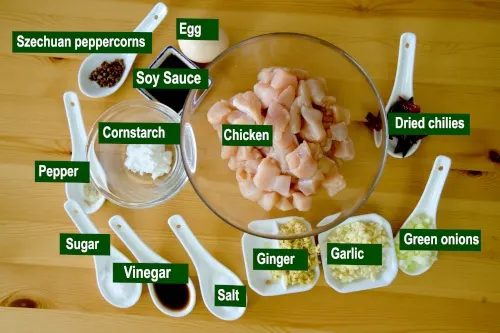
1. Marinate the chicken
Breast meat versus thigh meat
Chefs who use thigh meat vouch that it is juicier and the texture is more tender, but traditional Chinese chefs will only use breast meat, which has been used since the Ching dynasty.
The breast meat produces a more attractive Kung Pao chicken dish. It looks chunkier, glossier, and more appealing than the thigh meat. The chicken breast cubes coated with egg whites are significantly juicier and more tender.
The marinade contains salt, ground white pepper, Shaoxing wine, water, egg, cornstarch, and dark soy sauce.
Method:
- Cut the breast meat into large pieces 1 cm thick. Pinch the meat with a meat mallet or the back of a knife to tenderize it.
- Cut the meat into 1½ cm square cubes. After that, add the salt, ground white pepper, wine, and water. Egg, cornstarch, and 1/4 teaspoon of dark soy sauce. Mix it well
- Marinate for 20 minutes.
Note:
- Adding a small amount of water allows the meat to absorb moisture and become more tender.
- Beaten eggs help form a coating on the meat, preventing the surface from becoming too dry during deep-frying.
- Dark soy sauce should be added last, as the purpose is to add some color to the chicken pieces.
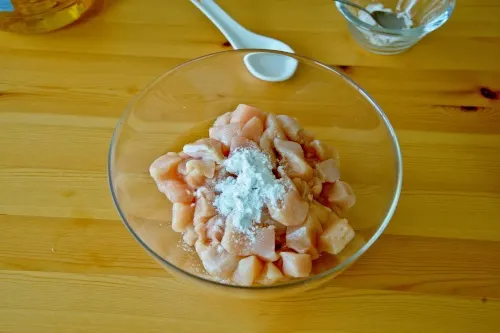
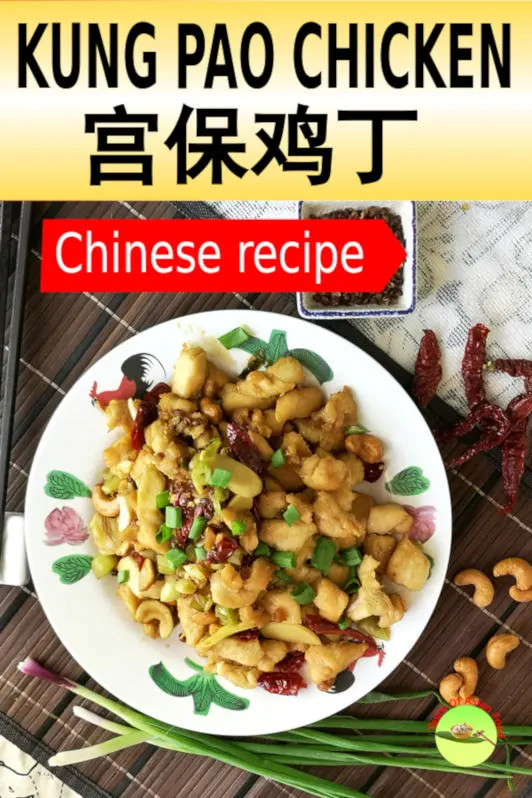
2. Prepare the Kung Pao sauce
While marinating the chicken, prepare the sauce for the Kung Pao chicken.
The sauce consists of light soy sauce, Chinese black vinegar, sugar, Chinese Shaoxing wine, ground white pepper, and cornstarch.
These items are often used together in other Chinese recipes. Therefore, some chefs like to pre-mix the sauce in a larger quantity and freeze it in divided portions. This method saves time, and the extra can be used for other dishes.
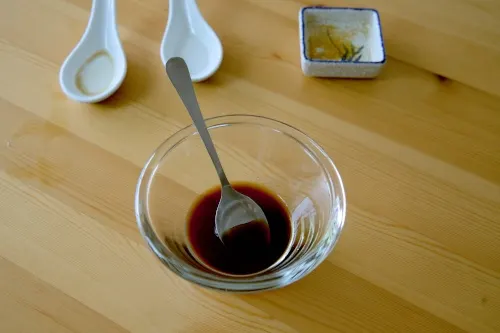
3. The aromatics and other ingredients
This recipe uses the same aromatics as General Tso’s chicken, but we used more dry chili.
- Garlic. It’s best to crush the garlic clove with the back of the knife. The whole clove has less of a tendency to get burnt during sauteing. Keep the heat low if you use minced garlic since it can quickly char over medium to high heat.
- Ginger. Cut the ginger into thin slices.
- Scallion. Cut the white section of the scallions into a half-cm section.
- Dry chili. Clean the dry chili with water, then cut into 3cm sections. Remove the seeds.
- Sichuan peppercorns. Add one tablespoon (see below).
4. Deep-fried the chicken
Deep-fry the chicken in hot oil for one minute at about 170°C/340°F. The chicken should be just cooked and remain tender. Remove and drain.
You can pan-fry the chicken with less oil if you prefer less oil. However, deep-frying ensures the meat pieces are evenly cooked.
5. Stir-frying
- Place about two tablespoons of vegetable oil in a wok or frying pan. Add garlic, ginger, dry chilies, and Sichuan peppercorns, and stir-fry over medium heat until aromatic.
- Return the deep-fried chicken to the wok.
- Add the kung pao sauce to coat the chicken.
- Coat the chicken evenly with the sauce.
- Flash fry for ten seconds. Add the roasted cashew nuts. Dish out.
Note: Groundnuts are used in China instead of cashew nuts.
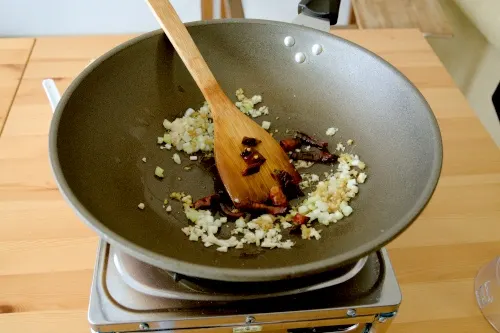
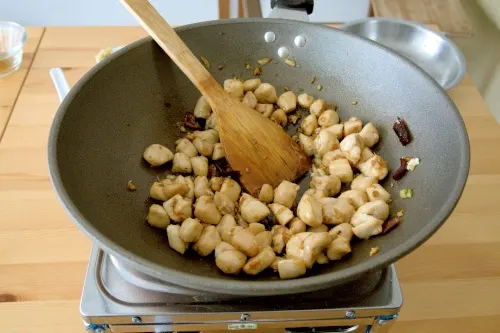
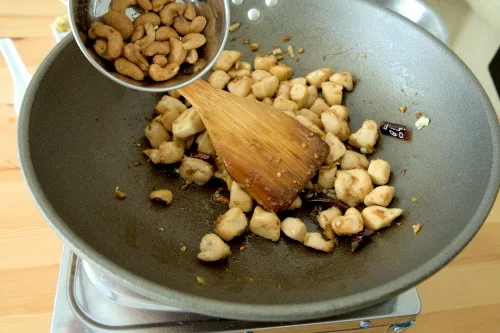
The result
This recipe meets the stringent requirements of the original Sichuan-style Kung Pao chicken. First, you taste the sourness and sweetness of the vinegar and honey, then the spiciness of the dry chili, and finally, the aftertaste of numbness on your tongue from the Sichuan peppercorns.
The spring onion’s vibrant color and the dry chili’s distinct maroon color make it visually attractive.
Sichuan peppercorns- an optional item
Sichuan peppercorns have a complex flavor and produce a tingly numbing sensation on the tongue. Harold McGee, in his book On Food and Cooking concisely describes this:
“They produce a strange, tingling, buzzing, numbing sensation that is something like the effect of carbonated drinks or a mild electrical current (touching the terminals of a nine-volt battery to the tongue).”
Marinating the meat with the ground Sichuan peppercorns yields a better result than adding them to the wok to saute with the ginger and scallions.
Note: If you think the taste is not what you want, it is perfectly fine to omit it. Some original Kung Pao chicken recipes from China do not contain Sichuan peppercorns.
The origin of Kung Pao chicken.
Kung Pao chicken is also famous in Southeast Asian countries where many Chinese live. It is named after the government officer Ding Baozhen 丁宝桢 of Sichuan Province during the late Qing Dynasty. Since his official position was palace guardian 宫保, pronounced as Gongbao, the dish has been named after his post until today.
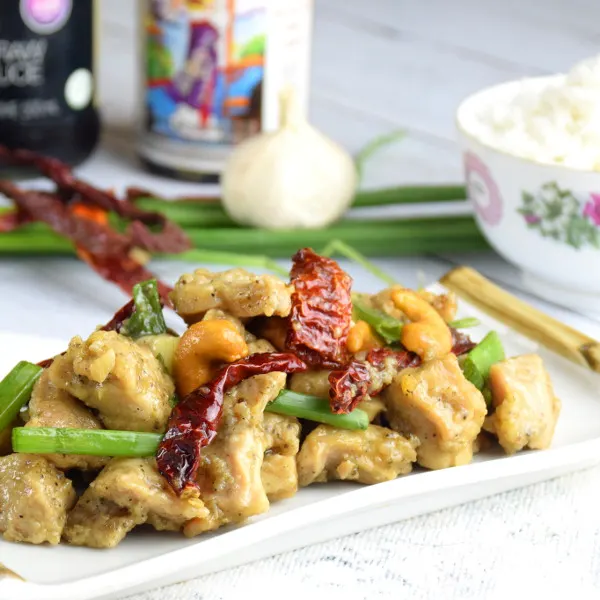
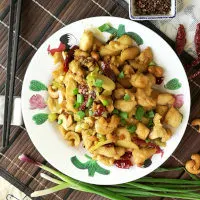
Kung Pao Chicken
Kung Pao chicken is one of the most popular Chinese cuisines in the world.
Ingredients
Marinade
- 500 g chicken breast meat
- 5g salt
- 1/4 teaspoon ground white pepper
- 1 tablespoon Shaoxing wine
- 1 tablespoon water
- 1/2 beaten egg
- 2 tablespoons cornstarch
- 1/4 teaspoon dark soy sauce
Sauce
- 2 tablespoons light soy sauce
- ½ tablespoon black vinegar
- 2 teaspoons sugar
- 1 tablespoon Shaoxing wine
- 1/4 teaspoon ground white pepper
- 1/4 teaspoon cornstarch
- 2 tablespoons water
Other ingredients
- 2 cloves garlic, smashed
- 20g ginger, cut into thin slices
- 1 tablespoon Sichuan peppercorn
- 3 stalk scallion, white section only
- 6 dry red chili, , cut to about 2 cm length, remove seeds
- 20 g cashew nuts
Instructions
- Cut the chicken into about 1½ cm square cubes. Add the ingredients in the marinade section above. Marinate for 30 minutes.
- Deep-fry the chicken in vegetable oil over medium heat for about two minutes until golden. Remove from oil.
- Mix all the ingredients in the Sauce section of the ingredients list.
- Place about 1 tablespoon of vegetable oil in a wok or frying pan. Add garlic, ginger, Szechuan peppercorns, scallion, dry chilies, and stir-fry over medium heat until aromatic.
- Add the chicken back to the pan.
- Add the kung pao sauce to the wok.
- Coat the chicken evenly with the sauce.
- Flash fry for ten seconds. Add the roasted cashew nuts. Dish out
Recommended Products
As an Amazon Associate and member of other affiliate programs, I earn from qualifying purchases.
-
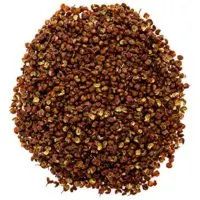 Soeos Authentic Szechuan Peppercorns (4 Ounces), Grade A Red Peppercorns, Sichuan Peppercorns, Chinese Peppercorns, Less Seeds, Szechuan Flavor Peppercorns, Szechuan Pepper for Mapo Tofu
Soeos Authentic Szechuan Peppercorns (4 Ounces), Grade A Red Peppercorns, Sichuan Peppercorns, Chinese Peppercorns, Less Seeds, Szechuan Flavor Peppercorns, Szechuan Pepper for Mapo Tofu -
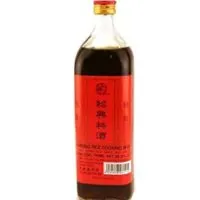 Qian Hu Chinese Shaohsing Rice Cooking Wine (Red) - 750ml | 1 Pack
Qian Hu Chinese Shaohsing Rice Cooking Wine (Red) - 750ml | 1 Pack -
Soeos Szechuan Dried Chili,Dry Szechuan Pepper, Dry Chile Peppers, Sichuan Pepper, Dried Red Chilies, 4oz, (Very Mild Spicy)
Nutrition Information:
Yield: 3 Serving Size: 3 servingsAmount Per Serving: Calories: 1523Total Fat: 78gSaturated Fat: 24gTrans Fat: 0gUnsaturated Fat: 35gCholesterol: 374mgSodium: 5524mgCarbohydrates: 74gFiber: 6gSugar: 14gProtein: 128g
This data was provided and calculated by Nutritionix on 6/6/2019

Kung Pao Shrimp Recipe (宫保虾球) - Easy Chinese Stir-fry
Saturday 19th of July 2025
[…] Kung Pao Chicken – This is the sister dish to Kung Pao Shrimp, with a nearly identical method of preparation. This kung pao chicken recipe is a classic stir-fried dish originating from Sichuan Province, China. […]
Sesame Chicken with honey - How to cook step by step
Sunday 9th of December 2018
[…] combination for General Tso’s chicken, which a favorite item in our restaurant. (Check out the Kung Pao chicken recipe if you like Chinese […]
Renato
Saturday 22nd of October 2016
Hi mint ! Truly, a very complete research, amazing. You're very skilled. Wonderful blog.
KP Kwan
Saturday 22nd of October 2016
Hi Renato. Thank you for your comment, and I am glad that you like Kung Pao chicken.
KP Kwan
KP Kwan
Friday 3rd of June 2016
Hi, this is KP Kwan. I am happy to see you at this comment area, as you have read through my recipe. I am happy to reply any questions and comments as soon as possible.